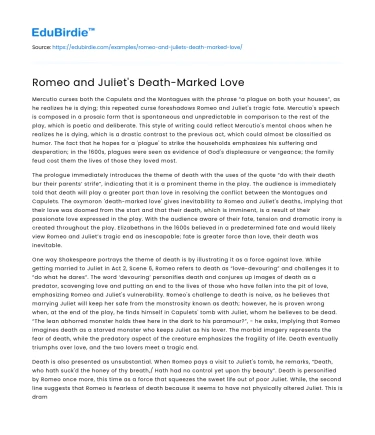Mercutio curses both the Capulets and the Montagues with the phrase “a plague on both your houses”, as he realizes he is dying; this repeated curse foreshadows Romeo and Juliet's tragic fate. Mercutio's speech is composed in a prosaic form that is spontaneous and unpredictable in comparison to the rest of the play, which is poetic and deliberate. This style of writing could reflect Mercutio's mental chaos when he realizes he is dying, which is a drastic contrast to the previous act, which could almost be classified as humor. The fact that he hopes for a 'plague' to strike the households emphasizes his suffering and desperation; in the 1600s, plagues were seen as evidence of God's displeasure or vengeance; the family feud cost them the lives of those they loved most.
The prologue immediately introduces the theme of death with the uses of the quote “do with their death bur their parents’ strife”, indicating that it is a prominent theme in the play. The audience is immediately told that death will play a greater part than love in resolving the conflict between the Montagues and Capulets. The oxymoron 'death-marked love' gives inevitability to Romeo and Juliet's deaths, implying that their love was doomed from the start and that their death, which is imminent, is a result of their passionate love expressed in the play. With the audience aware of their fate, tension and dramatic irony is created throughout the play. Elizabethans in the 1600s believed in a predetermined fate and would likely view Romeo and Juliet’s tragic end as inescapable; fate is greater force than love, their death was inevitable.
One way Shakespeare portrays the theme of death is by illustrating it as a force against love. While getting married to Juliet in Act 2, Scene 6, Romeo refers to death as “love-devouring” and challenges it to “do what he dares”. The word ‘devouring’ personifies death and conjures up images of death as a predator, scavenging love and putting an end to the lives of those who have fallen into the pit of love, emphasizing Romeo and Juliet's vulnerability. Romeo's challenge to death is naive, as he believes that marrying Juliet will keep her safe from the monstrosity known as death; however, he is proven wrong when, at the end of the play, he finds himself in Capulets' tomb with Juliet, whom he believes to be dead. “The lean abhorred monster holds thee here in the dark to his paramour?”, - he asks, implying that Romeo imagines death as a starved monster who keeps Juliet as his lover. The morbid imagery represents the fear of death, while the predatory aspect of the creature emphasizes the fragility of life. Death eventually triumphs over love, and the two lovers meet a tragic end.
Death is also presented as unsubstantial. When Romeo pays a visit to Juliet's tomb, he remarks, “Death, who hath suck'd the honey of thy breath,/ Hath had no control yet upon thy beauty”. Death is personified by Romeo once more, this time as a force that squeezes the sweet life out of poor Juliet. While, the second line suggests that Romeo is fearless of death because it seems to have not physically altered Juliet. This is dramatic irony since the audience know that Juliet is really living. Romeo metaphorically refers to carrying a yoke, a wooden crosspiece that connects to two oxen to plough, in the quotation 'shake the yoke of inauspicious starts from the world-wearied flesh,' to emphasize his heavy burden that he will be relieved from through his death. This adds to the effect of the feud, making us wonder if death is really anything to dread in a world as cruel and oppressive as Romeo's.
Suicide was considered a cardinal sin in the 1600s and it was thought that only God had the power to give and take life. The fact that both Romeo and Juliet choose suicide emphasizes their passionate love for each other and how it can lead to tragic deaths.






 Stuck on your essay?
Stuck on your essay?

